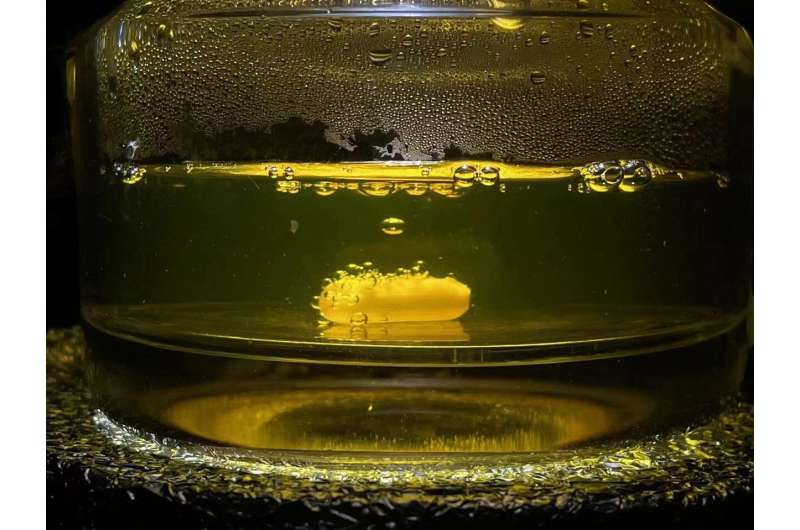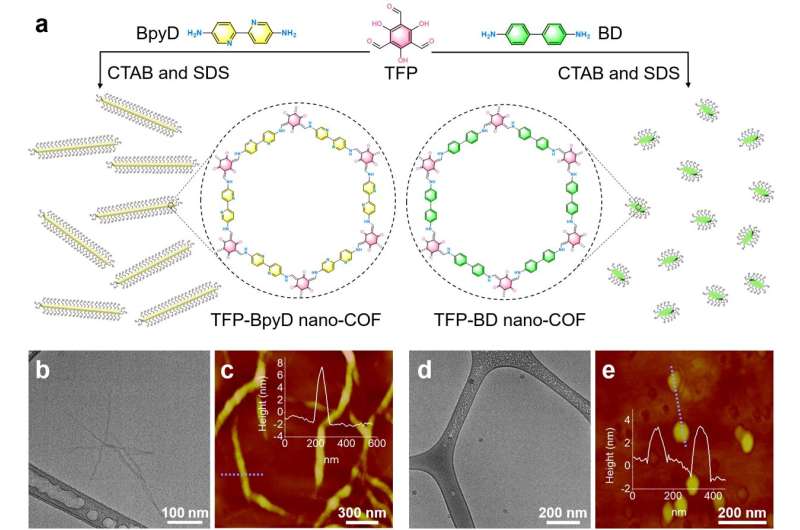
Have you ever considered how nanotechnology could transform our approach to clean energy? In recent research, we’ve been exploring nanoscale covalent organic frameworks (nano-COFs) that show exceptional potential for enhancing photocatalytic hydrogen production.
This study examines the synthesis and performance of these nano-COFs, paving the way for more efficient and sustainable hydrogen energy solutions. The study is published in the journal Nature Communications.
High active performance
Our study focuses on the synthesis and characterization of two specific nano-COFs, TFP-BpyD and TFP-BD, which exhibit remarkable activity in photocatalytic hydrogen production.
By reducing COF crystals to the nanoscale using surfactants, we’ve achieved significantly improved water dispersibility and light-harvesting properties. These advancements have led to impressive performance metrics, with one nano-COF demonstrating a hydrogen evolution rate of 392.0 mmol g−1 h−1. This rate is among the highest mass-normalized rates reported for any organic photocatalyst.

Reverse concentration-dependent photocatalytic phenomenon
Apart from the nanosizing of COF crystals enhancing their photocatalytic properties, one of the fascinating outcomes of our research is the reverse concentration-dependent photocatalytic phenomenon observed, where higher photocatalytic activity is recorded at lower catalyst concentrations.
This result challenges the conventional wisdom that more catalyst usually equates to higher activity, suggesting that there are optimal conditions for the most efficient operation of these nano-COFs.
Additionally, we’ve delved into the molecular excitonic nature of these nano-COFs, investigated through photoluminescence and transient absorption spectroscopy. This molecule-like excitonic behavior, a direct result of the nanoscale dimensions of the COFs, contributes significantly to their enhanced photocatalytic performance.
In summary, the nanosizing of COFs to create nano-COFs represents a significant advancement in the field of photocatalytic hydrogen production. These materials not only exhibit improved water dispersibility and light-harvesting properties but also demonstrate exceptional hydrogen evolution rates.
The discovery of the reverse concentration-dependent photocatalytic phenomenon adds an exciting dimension to the optimization of these materials.
Our research highlights the potential of nano-COFs to serve as highly efficient organic photocatalysts for solar fuel production. The future of sustainable energy solutions may well lie in the innovative use of nanoscale materials like these nano-COFs.
This story is part of Science X Dialog, where researchers can report findings from their published research articles. Visit this page for information about ScienceX Dialog and how to participate.
More information:
Wei Zhao et al, Nanoscale covalent organic frameworks for enhanced photocatalytic hydrogen production, Nature Communications (2024). DOI: 10.1038/s41467-024-50839-3
Wei Zhao obtained his Bachelor’s degree in 2015 from Hunan University. Then, he earned his MS degree in 2018 from Sichuan University under the guidance of Prof. Xikui Liu. He then moved to the University of Liverpool, where he successfully obtained his PhD in 2022 under the supervision of Prof. Andrew I. Cooper. Wei is currently furthering his research and expertise as a research fellow in Prof. Dan Zhao’s group at the National University of Singapore. His research interests focus on the synthesis and applications of covalent organic frameworks, such as photocatalysis and sorption
Citation:
New nanomaterials could boost hydrogen production for clean energy (2024, August 5)
retrieved 5 August 2024
from https://phys.org/news/2024-08-nanomaterials-boost-hydrogen-production-energy.html
This document is subject to copyright. Apart from any fair dealing for the purpose of private study or research, no
part may be reproduced without the written permission. The content is provided for information purposes only.
